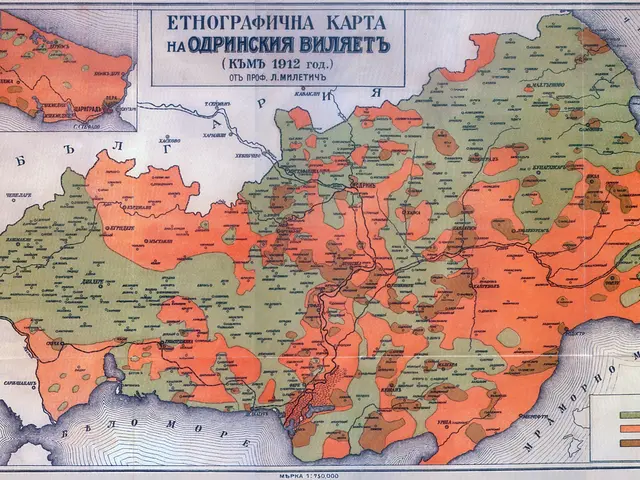Humpback Whale Washes Up Near Saint Peter-Ording, Germany: A Closer Look
Carcass of Whale Found on German Shoreline - Corpse of a humpback whale found on German shoreline
In a tragic discovery, a deceased humpback whale was found on the shores of Saint Peter-Ording. The 10-meter-long specimen, thought to be a mature male, was found 800 meters south of the sea bridge in the Bad district. The National Park Administration of the Schleswig-Holstein Wadden Sea confirmed the find.
Postmortem Examination Planned
The decaying carcass was carefully lifted into a container by a specialized recovery team and transported to an animal carcass rendering plant in Jagel. Further analysis will be conducted by the Veterinary School of Hannover, aiming to shed light on the animal's health condition.
Humpback whales, reaching lengths of up to 15 meters and weighing up to 40 tons, primarily feed on krill and small fish species. Historically widespread in the North Atlantic, their presence today is less common than in regions such as Hawaii or the Western North Pacific.
Strangely enough, another humpback whale stranded on the uninhabited island of Minsener Oog at the end of February. According to the National Park Administration, this humpback was undernourished and a juvenile.
Humpback Whales in the Wadden Sea: Rare Occurrence
Though humpback whales may occasionally pass through European waters, including the North Sea, they are not resident to this region like minke whales or harbor porpoises. The Wadden Sea, with its diverse marine life, is not a primary habitat for humpback whales.
Exploring the Mystery Behind Strandings
Strandings of whales—including humpback whales—can stem from various causes: entanglements, vessel collisions, noise pollution, climate change, disease, or infection. Understanding the root cause of these incidents can help conserve these magnificent creatures.
Knowing the specifics about strandings in places like Saint Peter-Ording and Minsener Oog would require consulting local marine conservation organizations or research institutions dedicated to studying the Wadden Sea ecosystem.
Stay tuned for more insights into these fascinating massive mammals as we continue to explore the mysteries behind their behaviors and the challenges they face in the North Atlantic.
Community aid could be granted to support scientific research aimed at understanding the reasons behind humpback whale strandings in the North Sea, specifically near Saint Peter-Ording and Minsener Oog. This research could potentially involve collaboration with environmental-science organizations and researchers in the field of marine biology.
Additionally, aid could be directed towards the production of agricultural products to help sustain the livelihoods of local residents who may be impacted by the attention and potential disruptions caused by the stranded whales and subsequent research activities.
In the realm of environmental-science education, resources could be allocated to discuss the significance of humpback whale strandings, their impact on the ecosystem, and the role of space-and-astronomy in studying these phenomena, fostering awareness and appreciation for the natural world among students.
Meanwhile, fans of mixed-martial-arts could organize fundraising events to contribute towards the conservation efforts for humpback whales, combining their passion for sports with a cause that supports the protection and understanding of these majestic creatures in the North Atlantic.








